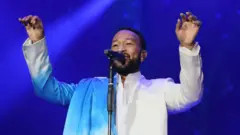American music icon John Legend faced a wave of criticism following his recent performance in Kigali, Rwanda. The concert, part of the Move Afrika initiative by Global Citizen, ignited a heated debate due to Rwanda’s alleged involvement in the ongoing conflict in the neighboring Democratic Republic of Congo (DRC). Despite the backlash, Legend defended his decision to perform, emphasizing his belief in engaging with the Rwandan people directly.
 Getty Images John Legend performs onstage during Global Citizen
Getty Images John Legend performs onstage during Global Citizen
The “All of Me” singer, known for his EGOT status – Emmy, Grammy, Oscar, and Tony Awards winner – addressed the controversy in an interview with the BBC after his Kigali concert. “I don’t believe that we should punish the people of Rwanda… when we disagree with their leaders,” Legend stated, underscoring his perspective on the situation. His performance took place against a backdrop of escalating tensions in eastern DRC, where M23 rebels, reportedly backed by Rwanda, have made significant territorial gains.
Reports indicate that Rwanda has deployed approximately 4,000 troops across the border to support the M23, leading to a humanitarian crisis with hundreds of thousands displaced and a surge in violence, including sexual assault against women and children. Critics argued that John Legend, with his influential platform, could have made a powerful statement by cancelling the concert, thereby drawing greater attention to the DRC conflict.
Adding another layer to the discourse, Nigerian singer Tems withdrew from a scheduled performance in Rwanda just days after Legend’s concert. Tems stated on social media that she would “never, ever intend to be insensitive to real-world issues,” a move widely interpreted as a direct contrast to Legend’s decision.
However, John Legend stood firm on his commitment to the Move Afrika event. He clarified that his performance was not financially motivated and was driven by a desire to contribute to the development of touring infrastructure in Africa, a continent often overlooked by major international artists. “I’m aware of what’s happening [in DR Congo] and I’m aware of the calls there have been for me to not do this show,” Legend told the BBC, reiterating his belief in the importance of the Move Afrika mission.
While the John Legend Concert in Kigali was met with enthusiasm from attendees, social media platforms became a battleground of opinions. The online backlash was so intense that Legend removed an Instagram post promoting the event. Denise Zanesa, a Belgium-based activist, voiced strong opposition, arguing that performing in Rwanda was akin to “collaborating with oppression.” This sentiment resonated with many, including Simone Umba in the US, who questioned Rwanda’s use of “Black American culture” to normalize its actions in eastern Congo.
This controversy is not the first time Rwanda’s relationship with prominent global figures has come under scrutiny. The nation has faced accusations of “sportswashing,” using high-profile sponsorships in European football, like with Arsenal, Bayern Munich, and Paris St-Germain, to deflect attention from alleged human rights issues. Despite receiving substantial foreign aid and investing heavily in tourism through initiatives like “Visit Rwanda,” the country’s actions in the DRC continue to draw international condemnation. When questioned about “sportswashing,” John Legend’s team declined to comment, suggesting that his focus remained on the music and the intended positive impact of the Move Afrika concert.
John Legend’s history of political activism, including his criticism of former US President Donald Trump and his break with Kanye West over political differences, adds complexity to his decision to perform in Rwanda. While some see his concert as tacit support for the Rwandan government, Legend maintains that his intention was to support the African continent’s burgeoning music scene and connect with fans, irrespective of political considerations. The debate surrounding the John Legend concert in Rwanda highlights the intricate intersection of music, politics, and international relations, leaving audiences and observers to grapple with the ethical implications of cultural exchanges in conflict zones.
